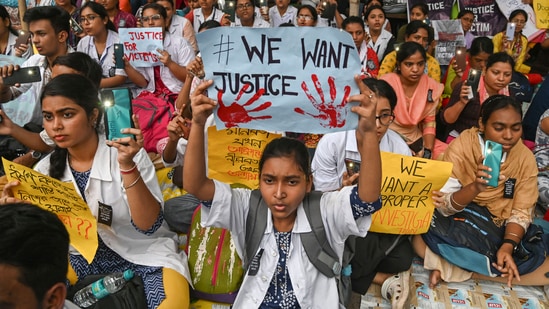By Lauren Prem
Rape and murder, considered brutal crimes, almost always evoke huge public outrage. Such is the recent case of a man, named Sanjay Roy, who is alleged to have committed rape and murder of a 31-year-old doctor, whose body was found on 9th August 2024, at the seminar room of R G Kar Medical College and Hospital, Kolkata. This horrendous incident has infuriated the Indian Medical Association (IMA) and so many doctors, across the state and other parts of India, leading them to protest regarding speedy imposition of punishment on those responsible for the said crimes.
Colloquially called the Nirbhaya 2.0, this incident has stunned the entire nation that was heading towards the goal of safety and equality. According to the autopsy report, the woman’s private parts were covered in blood, injury marks were present on her body and her neck was broken. This dismay strikes at the very core of a woman’s right to dignity and bodily autonomy under article 21 of the Constitution. The basic rights envisioned by the drafters of our Constitution, has repeatedly, proven to be at jeopardy due to the violence against women that happens in our country at an enormous rate.
This incident is devastating in the sense that it reinforces the safety issues faced by women at workplaces. An insecure working environment is not only a threat to the current women workforce, rather it prevents women, especially from rural areas, from entering the job sector. Indirectly, progress and independence of women is at stake, consequently obstructing the vision of equality that our Constitution envisages.
Apart from equality, sexual assault cases followed by horrific crimes like murder, indirectly prevent women from accessing other fundamental rights guaranteed under Part III of the Constitution. Instillment of fears regarding one’s safety obstructs the right to free movement enshrined in article 19(1)(d) of our Constitution. With regard to the case at hand, article 41 under the Directive Principles of State Policy (DPSPs), is relevant as it places an obligation on the state to secure right to work. A safe working environment can reasonably be interpreted to fall within the scope of this article. Remotely, women are obstructed from freely exercising their right to work due to the horrific message that such incidents communicate to the women in the society.
Other than impacting the career development of women, deep-seated stereotypes aggravate the trauma faced by women as a result of being victim to these crimes. Usually, women are considered to be at fault in rape and sexual assault cases. Victim-blaming is a very common term used in this context to denote the society’s denigrating attitude towards women – who are often accused of inviting the interest of sexual offenders through their clothing or actions. In this particular case, the principal of the College, Dr. Sandip Ghosh, was forced to step down after allegations of victim-blaming as he questioned why the woman was sleeping in the seminar room, rather than dealing with the main issue of safety and security.
According to the Kolkata police, the accused has confessed to the crime and the police had found a pornographic video on his phone. This particular digital record has direct relevance to the case at hand, owing to the detrimental effects of porn on an individual’s state of mind. While the Supreme Court considers access to pornography to be a part of one’s right to personal liberty under article 21, implementation of safety measures for women must be properly put in place. If not, this right would prove to be against the larger societal interests that are as, if not more, crucial as the right to personal liberty.
Public outcry, like in this case, is an expression of frustration towards the gender-based issues happening in our society, wherein the fault is completely perceived to be on the perpetrator rather than the victim. In this way, public outcry changes societal perceptions that is largely rooted in patriarchy, or male superiority. The change here represents a shift towards regarding fundamental rights as ultimate and a shift away from lingering stereotypes – those that form excuses for violence by placing the blame on women.


